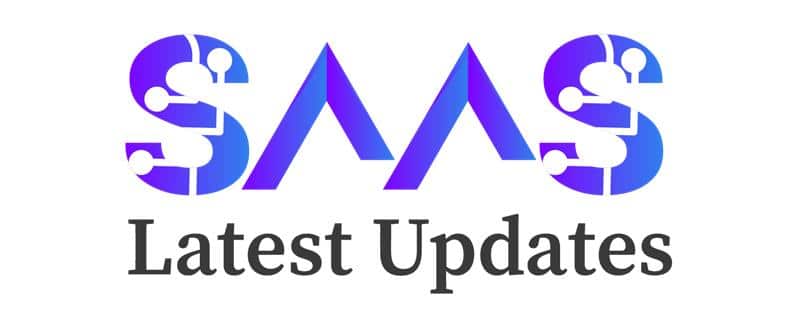As the technological world evolves rapidly, artificial intelligence has become crucial across all industries. AI has transformed industry standards. This technological shift has completely changed how industries operate.
With SaaS, AI is redefining customer experience and is a catalyst behind innovation. If you want to know what AI SaaS is, you are in the right place.
In this blog, we will discuss everything about AI SaaS. You will learn the benefits, features, and practical uses of this technology in the real world.
30-Second Summary
AI SaaS has become more than a trend. Every company wants to streamline its tasks efficiently and this is where AI SaaS comes into the picture. But what is AI SaaS and how is it becoming prevalent?
In this blog, you will learn everything about this technology. Discover how startups can use AI SaaS platforms, some real-world success stories and much more in this guide.
What is AI SaaS?
AI SaaS (Software as a Service) platforms are hosted on the cloud. You do not pay a significant upfront cost for infrastructure. Instead, these solutions work on a subscription model. That means that you need to pay a recurring fee monthly or annually to access them.
AI SaaS providers offer machine learning, computer vision and natural language processing. Organizations do not have to develop any complex in-house AI. They can quickly adopt and deploy AI-driven strategies with these solutions.
Consequently, companies improve their operations while enjoying the myriad of benefits that come with using artificial intelligence.
What are the Benefits of AI in the SaaS Industry?
Let’s have a look at the advantages of AI in SaaS applications.
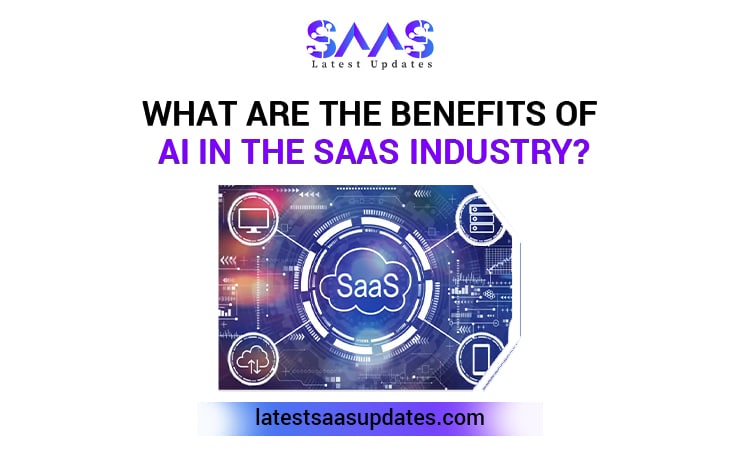
Predictive Engagement
AI can predict early on if your users stop using the app. It provides analytics of user engagement and why they might be losing interest. On the basis of this predictive analysis, you can offer a discount or a personalized message to retain them.
24/7 Customer Service
The flood of messages and customer queries can leave your team overwhelmed. When customers do not get answers on time, they might feel frustrated. The chatbots are available around the clock and can answer FAQs. It will increase the number of happy customers for your application.
Cost Savings
AI reduces manual labor and costs by streamlining the workflow. Businesses see an increase in efficiency after using AI for SaaS solutions. This cost reduction is particularly important for small businesses. They don’t need large teams and can save their resources with AI.
Data-Driven Marketing
AI SaaS provides smarter solutions to your marketing strategies. Your team does not need to do the guesswork. AI shows exactly what your clients do. It also shows you what ads are helpful. Consequently, you get better results, more clients and more revenue.
Personalization
Every client has unique needs. But how can you serve each of them in a way that feels personal? This is exactly where AI SaaS helps you. These solutions analyze user behavior and preferences. Organizations can deliver tailored experiences to make customers happy and increase retention.
Difference Between AI SaaS and Traditional SaaS
AI SaaS and traditional SaaS both use a subscription model and are hosted on the cloud. However, the main difference lies in their functionality.
Let’s compare both to see their unique aspects.
| Characteristic | AI SaaS | Traditional SaaS |
| Functionality | Automates decisions and predictions | Performs predefined tasks based on human input |
| Customization | Highly adaptable | Limited with fixed workflows |
| Data Usage | Statically stores and analyzes data | Analyzes data actively |
| Scalability | Horizontal | Vertical |
| Automation | Manual triggers | Advanced automation |
| Examples | Google Docs, Trello | Jasper AI, Salesforce Einstein |
Top AI SaaS Products for Your Business
Scalability and accessibility are two characteristics that make AI SaaS ideal for your business. These solutions change with your organization’s needs. Moreover, the easy accessibility allows you to use them anywhere and at any time.
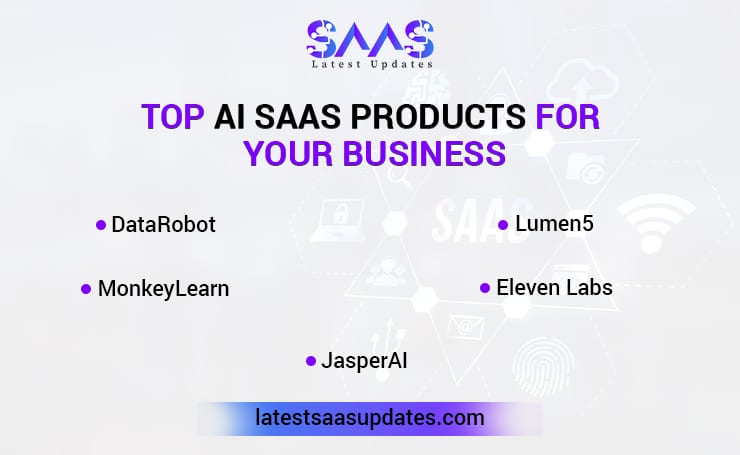
Some popular AI SaaS tools are:
DataRobot
This machine learning tool offers predictive analysis and business intelligence. It is designed for enterprises and doesn’t require data science expertise.
Features
- Automated deployment
- Real-time analytics
- Integration with the existing system
Use Case
- Sales forecasting
- Risk management
- Fraud detection
- Marketing Analytics
Lumen5
Lumen5 turns written content into a video. It is used by marketing teams to create videos quickly and easily.
Features
- AI-based video creation from text
- Customizable templates
- Multi-language support
Use Case
- Creates short and engaging social media videos
- Engaging video ads for digital marketing
- Internal communication to build the company’s culture
MonkeyLearn
MonkeyLearn is widely used for text analysis. It automates text classification and provides insights from unstructured data.
Features
- Sentiment analysis
- Data extraction
- Collaboration tools
Use Case
- Analyze customer feedback from different sources
- Examine brand sentiment on social platforms
- Shows how customers interact with your products
JasperAI
JasperAI uses the GPT-3 model for content creation. It is mainly used for generating written material, such as blogs and social media content.
Features
- Automated content generation
- SEO optimization
- Plagiarism checker
Use Case
- Generates blog posts and marketing copy
- Repurpose existing content for other platforms
- Produces social media posts and captions
Eleven Labs
ElevenLabs specializes in automated speech recognition. It is popular in customer service, automated content creation, and transcription services.
Features
- Text-to-speech feature
- Voice Cloning
- A library of sound effects
Use Case
- Creates dynamic audio content for social media
- Voice for audiobooks and articles
- Animate video game characters
How to Select the Right AI SaaS Tool for Your Business?
With so many options available, choosing the right AI SaaS platform can be confusing. Have a look at what you should consider for investing in an ideal tool.
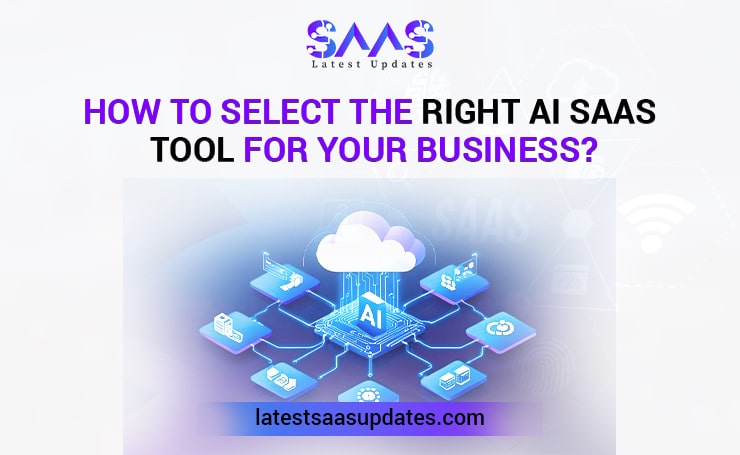
Define your Business Goals
Firstly, you need to define what your business’s needs are. Do you want to automate tasks? Or do you want to improve customer experience? Choose the AI SaaS platform that will assist you in reaching your business goals.
Research Different Tools
Research and evaluate different tools and see their use cases. Opt for the features that address your business’s needs. In addition, keep your budget in mind. Price comparison will narrow down your options, making the decision easier.
Testing
It is necessary to test the tool before investing in it. You should request the potential vendors for the tools’ demos. Start with a pilot project. Evaluate its functions. This experiment will provide you with key metrics of the tool’s performance.
Leading AI SaaS Companies
AI has become a major marketable asset for SaaS companies. Below are some leading artificial intelligence SaaS companies.
C3.ai
C3.ai is one of the top AI SaaS companies. This enterprise focuses on operating large-scale AI, IoT applications and predictive analysis for other companies. No matter what industry you are active in, you can use C3.ai applications.
One Concern
One Concern is a SaaS company. It focuses on providing damage estimates using AI on natural science phenomena. Their AI services and machine learning assist global disaster scientists in productively managing the emergency lifecycle.
Shift Technology
Shift Technology is a leading cybersecurity company. This enterprise combines AI and the latest mathematical algorithms. Its predictive analysis is used in the sports market as well. AI betting assistant provides data-backed insights for risk management.
SalesForce
Salesforce is a recognized software company globally. They have joined hands with other AI companies to improve their AI service: Salesforce Einstein. This partnership helps build applications efficiently.
Wix
Wix is popular among e-commerce businesses. This platform employs AI to create personalized websites for customers. The best part is that the AI SaaS website you create has multiple features and is mobile-friendly. You can enhance the ROI of your business with that website.
CrowdStrike
CrowdStrike is a SaaS company, leveraging AI for holistic security. It has a Falcon platform that identifies any malicious activity even before the breach happens. This helps companies take action to keep their data safe.
InMoment
InMoment is a SaaS platform that offers Voice of Customer (VoC) services. You can use their phone and web-based automated feedback systems. InMoment is popular across every industry, including food, healthcare, finance and insurance.
AI SaaS Builder: An Overview
An AI SaaS builder is a tool that creates apps and software by using artificial intelligence. The entire process happens online and you do not need to install anything.
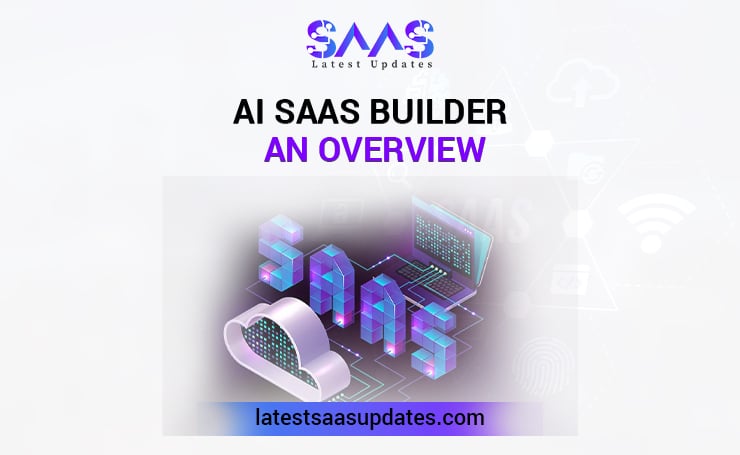
This tool also automates the process from start to end. You do not need to have knowledge of coding to develop any application with the AI SaaS builder.
Examples of AI SaaS Builders
Momen: It is a no-code platform. You can build apps with AI capabilities, live previews and clear pricing.
Builder.io: It leverages AI for the design and development of the SaaS pages without coding.
Microsoft Power Apps: It uses artificial intelligence to create and design apps.
Softr: It is known for its speed and ease of use. You can build and launch applications through it.
Airtable Cobuilder: This platform uses data views. It streamlines the app development process from the data.
Create: You can create an application using this platform with a single prompt.
DataButton: It uses AI agents to create apps.
Pros and Cons of No-Code AI SaaS Builder
AI SaaS builders have their pros and downsides. Let’s see both in this section.
Pros
Cost-Effectiveness: The development of AI SaaS based applications does not require coding. It overall reduces the development costs of development for businesses that don’t have enough resources.
Flexibility: Organizations can easily customize the apps according to their needs. You can adjust the functionalities and integrations easily.
Speed: AI SaaS builder offers quick deployment of the applications. The pre-built modules help developers to create, design, and launch products rapidly.
Scalability: The quality of scalability in AI SaaS apps allows them to expand with the business. You can evolve your business without any problems.
Cons
Lack of Human Design: AI SaaS websites or apps often lack the creative touch of a human UX designer. It can develop a website quickly but it will not offer the brand differentiation you want.
Customization Limitations: AI SaaS builders can create a simple website but cannot handle complex development. You might need to hire a developer to manage these sophisticated tasks.
Misleading Claims: The claim of these builders that you do not need technical knowledge is true for basic websites. You need human expertise for coding and marketing strategies to enhance the potential of these tools.
Copyright Concerns: AI-generated content might not be copyright-protected. It can cause legal issues for businesses. You need to ensure originality in your content.
How Startups Can Use the AI SaaS Space?
Around 75% of businesses are ready to integrate AI into their products by 2025. Revolutionary, isn’t it? If you are a startup, you need to leverage AI since it is transforming business models.
The Ways to Use AI SaaS
- For startups, a large team may be a little out of budget. For that, you can use AI SaaS platforms to automate repetitive tasks.
- Artificial intelligence SaaS tools analyze the workflows of your company. It recognizes the area that needs optimization and increases efficiency.
- You can use predictive analysis to identify trends and predict outcomes. These tools are ideal for creating an effective strategy.
- AI SaaS tools also analyze user data. They provide personalized recommendations, which lead to increased user engagement.
- AI SaaS startups can provide customer support 24/7 through chatbots. It evaluates customer feedback and identifies areas of improvement.
- A startup can compete with large enterprises through AI-powered strategies. You can also develop and deploy a product as quickly.
Best AI SaaS Platforms for Startups
For Communication and Content Creation: ChatGPT, Synethsia, Notion AI and HeyGen
For Sales and Marketing: Pipedrive AI CRM, Hubspot’s Breeze, AdCreative.ai and Insider
For Project Management and Productivity: Replicon AI, Fathom, ClickUp, Forecast and Fireflies.ai
For Data Analysis and Visualization: Tableau, AI Excel Bot, Delve AI, Aomni and Browser AI
AI SaaS Application Across Industries
Every industry is accepting AI as it optimizes operations and retains its client base. It also helps you stay on top of the competition.
Have a look at the practical application of AI SaaS in various industries.
Retail
AI SaaS in retail provides personalized recommendations to your clients based on their preferences. It also plays an important role in demand forecasting and customer engagement.
Financial Services
AI SaaS solutions automate report generation to streamline compliance processes. They also detect fraud and anomalies in a large number of transactions.
Industrial Manufacturing
In industrial manufacturing, AI can identify equipment issues before they cause costly repairs. It also offers advanced quality control for a seamless process.
Enterprise IT
AI-driven analytics offer in-depth insights into the performance of the IT management system. Additionally, the cybersecurity services provide protection against threats.
Media
You can engage viewers with content analytics. Customers get personalized recommendations and satisfy viewers. The categorization of videos makes content accessible to the audience.
Challenges in Implementing AI SaaS
Despite the prevalent use of AI, many businesses have concerns about implementing AI SaaS. In this section, we will break down these challenges faced by organizations.
Accountability and Risk Management
Companies may find it difficult to tell how an AI SaaS platform came up with a particular outcome. This is because of the complex algorithm. It makes it difficult to track down decision-making processes.
In high-stakes industries, such as autonomous vehicles, financial trading and medical diagnosis, a wrong outcome can have legal and life-threatening consequences.
Bias
There can be bias in the data if the algorithms of AI SaaS tools are not designed carefully. It can be significantly risky for fintech SaaS applications.
These biased algorithms can be discriminatory against marginalized groups. Companies using AI SaaS should opt for regular audits of AI systems to mitigate bias.
Data Privacy
AI systems use large databases for training. It raises concerns about data privacy. In healthcare, finance and biotech, managing data integrity is necessary. SaaS companies should comply with GDPR and HIPAA.
They should also adopt transparent policies for collecting and processing data. Encryption and anonymization maintain user trust in your services.
Regulatory Compliance
Regulations are evolving with AI. This technology has created uncertainty around regulatory compliance for SaaS companies. AI SaaS is introducing transparency, fairness and ethical use of artificial intelligence.
An easy solution for this concern is working with legal experts and adhering to AI best practices.
The Future of AI SaaS
The study shows that the AI-created SaaS market will surge from $101.7 billion in 2025 to $1.04 trillion by 2032. The CAGR will be 39.4%.
The rivalry has become fierce since more and more companies are adopting AI SaaS frameworks. Other organizations need to employ artificial intelligence to not fall behind.
The future of AI SaaS in every industry is bright. Giant corporations like Microsoft and Oracle are using AI to reach a broad range of customers. In the future, even small businesses will collaborate with AI SaaS to widen their client base.
Now, no company goes with random suggestions. For instance, Amazon uses predictive analysis to understand the needs of customers. In this era, bringing AI into your business is a smart move to climb higher.
Real-World Success Stories of Using AI SaaS
New stories emerge regularly where an AI SaaS solution altered the system for more efficiency. Let’s see some of these real-world incidents.
- Aberdeen City Council used Microsoft Copilot to offload tasks and free up workforce capacity. By using this AI tool, they projected 241%ROI, enhanced productivity and saved $3 million annually.
- Architecht developed OBA Suite (a cloud-based platform) using Azure AI Services and GitHub Copilot. With low/no code capabilities, UI and UX prototyping takes only 25 minutes instead of 2 hours.
- Volvo Group used Azure AI Services and Azure AI Document Intelligence. They simplified document processing. They also met the objectives of data extraction from images and translation. This step saved Volvo Group 10,000 manual hours.
Final Thoughts
AI SaaS is no longer a trend. It has become an integral part of the growth strategy for businesses. Implementing artificial intelligence SaaS gives you a competitive edge and delivers a satisfactory user experience.
From automating tasks to personalized services, AI SaaS is transforming every industry rapidly. Check out the Latest SaaS Updates for more SaaS-related content.
FAQs
What is AI SaaS?
AI SaaS solutions are cloud-based platforms. They are managed by the vendor. You do not need to install software or infrastructure to use it. You can simply use it in a browser through an internet connection.
How much does it cost to build an AI SaaS Product?
An AI SaaS product can cost from $30,000 to $300,000. The price depends on various features, such as complexity, features, and business requirements.
What are the Examples of AI SaaS?
Some famous AI SaaS platforms are ChatGPT, Jasper, Copy.ai, Canva, HubSpot AI and Shopify Magic.
